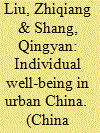| Srl | Item |
| 1 |
ID:
147414


|
|
|
|
|
| Summary/Abstract |
Using a panel of Chinese cities over the period 1991–2010, we examine the determinants of economic growth, focusing on the role of foreign direct investment (FDI) and human capital. Consistent with the predictions of a human capital-augmented Solow model, we find that the growth rate (along the path to the steady-state income level) of per capita GDP is negatively correlated with population growth rate and positively correlated with investment rate in physical capital and human capital. We find that FDI has a positive effect on the per capita GDP growth rate and this effect is intensified by the human capital endowment of the city. The latter suggests that one way that human capital contributes to growth is to serve as a facilitator for technology transfers stemming from FDI. Furthermore, we find some suggestive evidence that the FDI-human capital complementary effect is stronger for technology-intensive FDI than for labor-intensive FDI. Our results are robust to alternative measures of human capital, model specifications, and estimation methods.
|
|
|
|
|
|
|
|
|
|
|
|
|
|
|
|
| 2 |
ID:
116508


|
|
|
|
|
| Publication |
2012.
|
| Summary/Abstract |
Using household survey data, we study the determinants of individual well-being in urban China, emphasizing particularly the role of income expectations. First, we find that individual well-being increases contemporaneously with own income and decreases with community's average income, consistent with findings reported in previous studies. This result holds when we replace income with consumption and when we consider employment and health status of other family members. Second and more important, we find that income expectations have a positive and significant effect on individual well-being. This result is robust to alternative model specifications and to controls for optimistic personality. Instrumental variable estimates and endogeneity tests suggest that the positive relationship between well-being and income expectations is genuine. Our finding has the potential to explain why reported well-being has declined in China despite the spectacular economic growth in the past decades.
|
|
|
|
|
|
|
|
|
|
|
|
|
|
|
|
| 3 |
ID:
161875


|
|
|
| 4 |
ID:
161833


|
|
|
|
|
| Summary/Abstract |
Using data from a rural household survey in China in 2009, we examine the impact of parental migration on children's educational outcomes. Consistent with the findings of a large empirical literature, we find that parental migration has a significantly negative impact on left-behind children's educational outcomes as measured by test scores in Chinese and math. But unlike much of the existing studies on the subject, we focus on the remediation effect of return migrant parents on once left-behind children's performance. This empirical strategy allows us to avoid the endogeneity issue concerning the migration decision that may have contaminated previous studies. We find evidence that return migrant parents help alleviate the harms caused by parental migration, and the remediation effect is stronger for children attending middle schools, and stronger for daughters. We also find suggestive evidence that return migrant parents improve children's performance through increases in after-school study time and education-related expenditures, following the return of migrant parents.
|
|
|
|
|
|
|
|
|
|
|
|
|
|
|
|